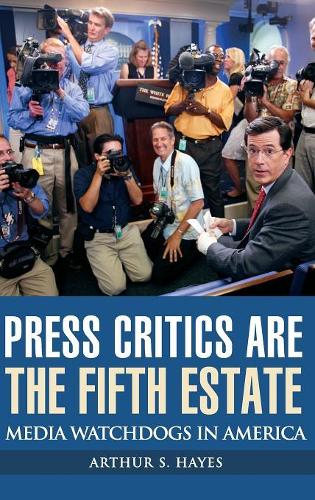
Press Critics Are the Fifth Estate: Media Watchdogs in America
(Hardback)
Publishing Details
Press Critics Are the Fifth Estate: Media Watchdogs in America
By (Author) Arthur S. Hayes
Bloomsbury Publishing PLC
Praeger Publishers Inc
30th June 2008
United States
Classifications
Tertiary Education
Non Fiction
News media and journalism
071.3
Winner of Finalist, 2009 Tankard Book Award 2009 (United States)
Physical Properties
Hardback
208
Description
Robust, uninhibited, provocative, and even scurrilous criticism of corporate media by the Fifth Estatecomposed of private citizens and watchdog and partisan groups of all stripesis vital to the functioning of the American democratic process. Hayes reviews the historical development of press criticism since the 1880s in each of ten categories: muckrakers, journalism reviews, columnists and authors, television press critics, press councils, advocacy groups, scholars, ombudsmen, bloggers, and satirists. The author provides nine case studies of recent press criticism campaigns that have, though widely vilified as uncivil or marginalized as kooky, contributed significantly to checking the pretensions of corporate media to an unwholesome monopoly on journalistic truth.
Reviews
Hayes (Fordham Univ.) provides a sophisticated analysis of relatively recent criticism of the press. . . . Endnote documentation is extensive. Highly recommended. All readers, all levels. * Choice *
Hayesoffers the considered opinions of a long-time journalist who now teaches the subject at Fordham University in New York. And an interesting collection of opinions it is, with each chapter providing a separate essay on a given subject. . . . The overall tone is to defend the criticism of the news media, especially that coming from its users or audiences. But Hayes offers a balanced view of the many attempts at news councils, critical journals, pressure groups and the like to see what appears to work, and what does not. * Communication Booknotes Quarterly *
it would make a good addition to classes on ethics, media and society, media literacy, or concept and critical issues course. It seems well suited for seminar-style classes, especially at the graduate level. More importantly, this book makes the critical connection between theory and practice, addressing ethical issues in the real world. The chapters are discreet, so instructors can pick and choose, skipping around as necessary to fit the curriculum. * Journal of Mass Media Ethics *
Author Bio
Arthur S. Hayes is Associate Professor of Communications and Media Studies at Fordham University. He is former director of the graduate journalism program at Quinnipiac University, from which he took a JD. A journalist for 24 years, he worked for the Wall Street Journal, American Lawyer, and the National Law Journal.
